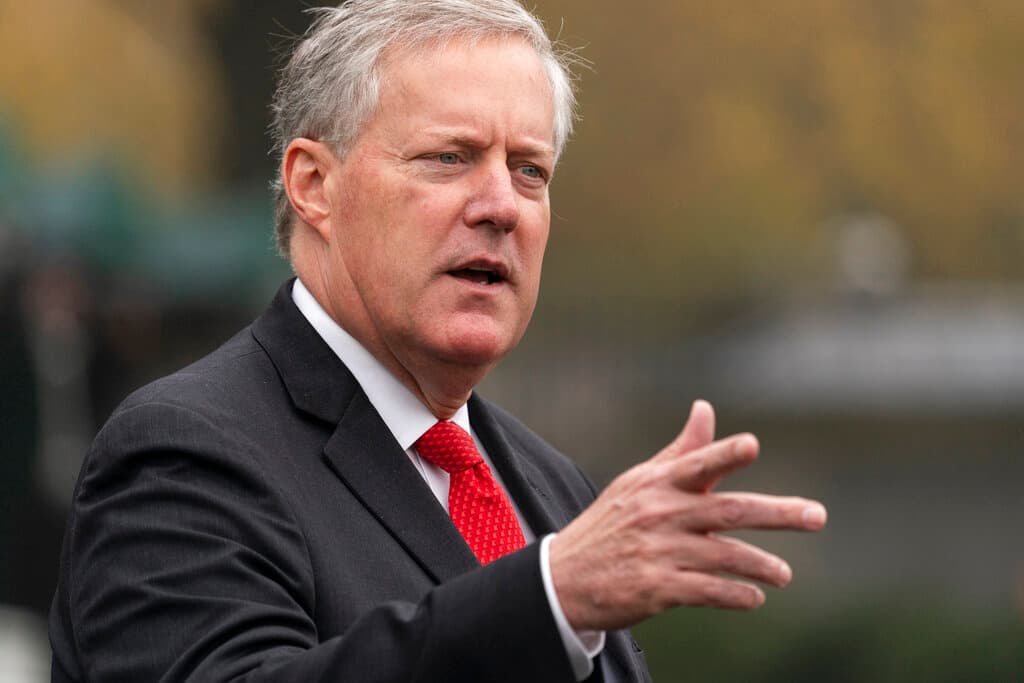Mark Meadows Seeks To Turn Trump’s Supreme Court Immunity Principle Against Fani Willis
The 45th president’s erstwhile aide-de-camp now seeks to ride on his former boss’s legal coattails.

Chief of Staff Mark Meadows’s petition to the Supreme Court that his criminal case in Georgia be moved to federal court on the basis of the Nine’s landmark immunity decision is the first invocation of that ruling by someone other than President Trump himself.
Mr. Meadows, Trump’s former aide-de-camp, seeks relief from the high court after meeting with frustration at the United States Court of Appeals for the 11th Circuit. The District Attorney of Fulton County, Fani Willis, has charged Mr. Meadows with two state crimes as part of her sprawling racketeering case.
That prosecution is stalled while the Georgia Court of Appeals considers whether to disqualify Ms. Willis because of a secret affair with her special prosecutor. Mr. Meadows has for a year sought to argue that because the activity for which he is charged was undertaken while he held federal office, his case belongs in federal court, rather than at Fulton County.
Statute allows a defendant to move for removal to federal court if the prosecution implicates a federal question. The trial judge, Scott McAfee, as well as the 11th Circuit, have already rebuffed his attempt to flee a Fulton County jury. That, though, was before the Supreme Court earlier this month decided in Trump v. United States that presidents are entitled to immunity for their official acts, but not for their unofficial ones.
That could be a bonanza for presidential power. Now comes Mr. Meadows to argue that the holding redounds to his benefit because the “threat posed by prosecutions against federal officers for actions relating to their federal functions does not evaporate once they leave federal office.” Meaning that the protections of immunity overhang not just the president, but also his camarilla.
The former chief of staff contends that “it is hard to imagine a case in which the need for a federal forum is more pressing than one that requires resolving novel questions about the duties and powers of one of the most important federal offices in the nation.” Mr. Meadows reasons that “to the extent the outer boundaries of the applicable immunities are underdeveloped and fact intensive, that is all the more reason why a federal forum is imperative.”
Mr. Meadows’s lawyer, the veteran Supreme Court advocate Paul Clement, acknowledges that Trump covered only the president, but contends that the epochal case “could significantly influence how lower courts address issues of federal officials’ Supremacy Clause immunity.” That clause of the Constitution ordains that when federal and state law conflict, federal law triumphs. Mr. Meadows accuses Ms. Willis of ignoring that mandate.
The erstwhile chief of staff’s legal team writes that “state court sensitive questions about whether and to what extent the Chief of Staff’s activities in service of the President can form the basis of a criminal prosecution has gone seriously awry.” Mr. Meadows reckons that aside from the chief executive himself a chief of staff is the most “senior official in charge of the Executive Office of the President.”
Mr. Meadows explains that the “Chief of Staff is a unique federal officer, the top aide to a coequal branch of government personified by the President.” Justice Clarence Thomas is the jurist appointed to manage appeals form the 11th Circuit. For a case to receive a hearing before the high court, four justices are required to express interest. The 11th Circuit wrote that “the events giving rise to this criminal action were not related” to Mr. Meadows’s official duties.
Now, though, Mr. Meadows writes with respect to removal that “a White House Chief of Staff facing criminal charges based on actions relating to his work for the President of the United States should not be a close call — especially now that this Court has recognized that federal immunity impacts what evidence can be considered.”

